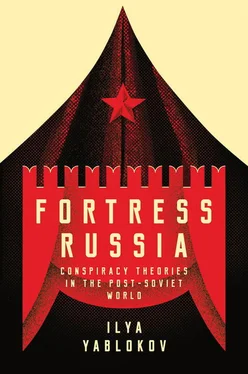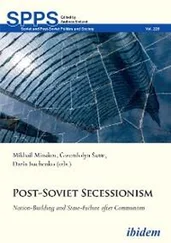The work of intellectuals prepared the way for introducing legislative limitations on the activities of NGOs. This goal was achieved at the end of 2005, when the Duma debated and adopted amendments to the law on NGOs despite domestic and international protests. The first set of amendments was approved by Putin on 10 January 2006, and led to much concern among civic activists and foreign diplomats (Khrestin, 2006).
In a press interview, one of the authors of the new legislation used conspiracy theories to substantiate its adoption by claiming that NGOs with foreign affiliation destroyed Russia ‘from within’, because Russians were too easily impressed by foreign influence:
It is clear for the West that Russia is a huge store of natural resources. That is why, for example, big Western business is ready to invest money in the development of Siberia through these organizations. But there is a question: why do they do that? The pragmatic West will not invest money without a reason. (Farizova, 2005)
The authors of the new legislative initiatives, embracing Putin’s idea that Russia’s sovereignty was its ultimate virtue, suggested a ban on the registration of NGOs in case their aims and goals created ‘a threat to sovereignty, political independence, territorial integrity, national unity and the distinctive customs, cultural character and national interests of the Russian Federation’ (Rossiiskaia gazeta, 2006). These vague criteria created obstacles for the registration for NGOs, since many of them them did rely on foreign funds; and pro-Kremlin politicians and intellectuals were then in a position to accuse NGOs of subversion.
The obedient media had to contribute to the creation of a negative image of NGOs, since many Russian citizens knew little, if anything, about their activities (Schmidt, 2006). The lack of attention paid by ordinary Russians to third sector organizations created a fertile ground for conspiratorial mythmaking. At the same time, it limited the Kremlin’s ability to construct the image of a powerful, subversive ‘Other’ threatening the lives of ordinary citizens. The regime was well aware of this problem, and so was keen to use the state-aligned media to persuade people that NGOs were linked to foreign subversion.
One significant feature of the campaign against NGOs was a documentary broadcast by the state-owned Rossiia television channel, which aimed to delegitimize NGOs by connecting them with foreign intelligence services. The most famous media effort of this type was to claim that British diplomats were involved in Western intelligence; this was a clear reminder of the Stalinist and Cold War periods when the notion of a British spy was central to the state-sponsored campaigns against the dissent. Arkadii Mamontov, who would later mount an attack on Pussy Riot, produced a documentary entitled Shpiony ( The Spies ). It was broadcast prime time on Rossiia channel on 22 January 2006 and became a significant media event which was subsequently discussed by most of the Russian press and provoked a diplomatic scandal between Russia and the UK (Spetsial’nyi korrespondent: Shpiony, 2006). An eleven-minute film showed an operation against alleged British spies carried out by the FSB. The spies supposedly used a rock in a Moscow park, which was stuffed with sophisticated electronic devices, to exchange information with their informants. Mamontov contended that Marc Doe, the second secretary of the British embassy in Moscow, was a British intelligence officer whose responsibility was to supply Russian NGOs with funding. On screen, Mamontov displayed documents, typed in English and all bearing Doe’s signature, showing the names of organizations (e.g. a prominent human rights watchdog, The Moscow Helsinki Group ), and the amounts of money which had been transferred.
The linking of the two issues (spies and NGOs) was made explicit at the start of the documentary. An FSB officer, Diana Shemiakina, stated that of the thousands of NGOs operating in Russia, only 92 were officially registered with the Ministry of Justice. ‘Most of them [NGOs] were created, financed and existed under the patronage of the governmental and civic organizations of the US and their NATO allies’ (Fishman, 2006). This supposed connection between NATO, the USA and Russian NGOs created the impression that the NGOs were betrayers of the country. To demonstrate a degree of impartiality, and, perhaps, to emphasize that NGOs could have played a bigger role in the everyday life of the Russians, Mamontov explained that most Russian NGOs were actually innocent organizations which assisted people in spheres where the government was unable to help. Despite this, however, Mamontov insisted that the people who worked in Russian NGOs needed to be more honest, and, unlike those specifically referred to in the documentary, work for the interests of Russia (Steshin and Baranov, 2006).
All the same, the film’s narrative was not objective, favouring the Kremlin’s position on NGOs and supporting its aim to curtail their rights. It correlated with the major accounts of NGOs which had appeared in Russia in the aftermath of the ‘Orange Revolution’ in Ukraine. On the one hand, it supported Patrushev’s claim that the foreign intelligence services worked through NGOs. On the other, it developed Putin’s argument that some NGOs consisted of corrupt people primarily interested in financial gain. Moreover, Mamontov substantiated the claim about the external threat by referring to Condoleezza Rice’s criticism of the new law on NGOs, when she was US Secretary of State (Kessler, 2005). In this context Rice’s speech, which also praised the successes of Ukrainian civil society, accorded with the conspiratorial view of NGOs as agents of foreign subversion.
Liberal Russian journalists who investigated the making of Mamontov’s film discovered that the Rossiia crew played virtually no role in the production; it was almost entirely in the hands of the FSB. Furthermore, the urgency with which the film was broadcast (it replaced another earlier scheduled programme) is an indication of the government’s involvement in the matter (Meteleva and Raskin, 2006). Representatives of the NGOs which were discussed in the programme stated that the documents that were received from the foreign grant organizations were actually signed by the first secretary of the British Embassy, not by Doe (Fishman, 2006).
Astonishingly, Tony Blair’s aide, Jonathan Powell, revealed in 2012 that the ‘spy rock’ had in fact been real and was used to receive information from the British spies stationed in Moscow (Topping and Elder, 2012). This gave considerable support to the Kremlin’s arguments against NGOs and the opposition in the later years of Putin’s rule. It is probable that Russian special services found out that Doe was a British intelligence officer and used that fact to sling mud at NGOs by creating a story about Doe’s cooperation with Russian civil society activists. These facts indicate that the conspiratorial story about the spy rock was deliberately disseminated with the purpose of delegitimizing NGOs and linking them to foreign spying activities in Russia. The wide dissemination by the state-aligned media of the alleged link between foreign spies and NGOs allowed the authorities to reach a large audience and influence ordinary Russians’ perception of non-governmental organizations.
The Spies prompted debates among politicians about the need to control NGOs, supplying the supposed ‘factual basis’ of the NGOs’ activities and bringing the conspiratorial interpretation of these activities into the public sphere. Duma deputies expressed concern about the funding of NGOs by foreign intelligence services, but without naming particular NGOs. This created an atmosphere of suspicion towards all NGOs, regardless of their aims and activities. Sergei Mironov, then head of the Council of the Federation, insisted that the spy scandal clearly demonstrated the need for strict laws regulating NGOs (Regnum, 2006). A few days later, Putin came out in support of this argument, complaining that the use of NGOs by foreign intelligence services destroyed the reputation of human rights activists ( Kremlin.ru, 2006). Seeing an opportunity to reiterate what he had previously said about the hypocrisy of civil society organizations in Russia, Putin insisted that the new law was legitimate and served to protect Russian sovereignty.
Читать дальше
Конец ознакомительного отрывка
Купить книгу












